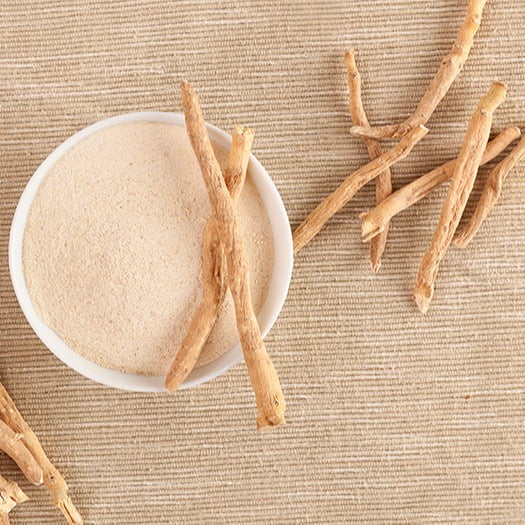nutrition
The Right Ashwagandha Dosage: How Much Should I Take?
On This Page

The amount of ashwagandha you should take depends on the reasoning behind your decision to take it.
Ashwagandha Dosage Guide (for individual use cases and desired effects)
The amount of ashwagandha you should take depends on why you’re taking it. It boasts a wide array of health benefits, both mental and physical. Commonly known as “Indian Ginseng,” ashwagandha has been used in the Indian practice of Ayurvedic medicine for centuries. It’s what’s called an “adaptogen” – a substance believed to boost the body’s resistance to physical, emotional, and environmental stressors. In an eight week study with 80 healthy adults, no side effects were reported by men or women. That said, longer-term and larger-scale studies are necessary for further demonstrating its effectiveness. We will take a look at what the research tells us about ashwagandha’s benefits and recommended dosages in the following sections.
Ashwagandha dosage for athletic performance
If you’re looking to improve your athletic performance, research shows that ashwagandha might help. Consider the recent study that measured the effects of ashwagandha on Indian cyclists. Cycling, of course, is a sport that requires a high level of aerobic capacity over a long period of time. So, a group of forty top Indian cyclists were chosen at random, and then equally divided into two groups: one that would receive 500 mg capsules of ashwagandha, twice daily for eight weeks; and another group that would receive placebo capsules. The findings were stark: The ashwagandha group saw across-the-board improvement in their aerobic capacity, energy level, and overall endurance capacity.

Another double-blind placebo-controlled study found that, over a period of 12 weeks, a 500 mg dose of ashwagandha supported muscle strength and recovery. While larger-scale studies are still needed, these studies suggest a strong connection between taking 500 mg to 1,000 mg of ashwagandha each day to support athletic performance.
Ashwagandha dosage for cognitive function
A recent study tested the efficacy of adults taking a 300 mg ashwagandha supplement twice daily. The study showed that ashwagandha may be effective in promoting memory and overall brain health, including attention and the speed of processing information. This finding is in keeping with the use of ashwagandha in traditional Ayurvedic medicine, which has long believed in ashwagandha’s ability to support brain health.
Ashwagandha has been shown to support cognitive function in other ways, too. Studies show that it helps promote better moods and more mental balance, along with sexual wellness.
One study found that taking 600 mg per day for two months improved subjects’ mental balance considerably. Another study that also used 600 mg per day found that ashwagandha was effective in supporting the mental health needs of people pursuing a healthier weight. Says the study: “A statistically significant reduction in body weight and body mass index were observed in patients treated with Ashwagandha root extract compared to placebo.” This, the study observes, is attributable to ashwagandha’s effect on subjects’ mental well-being. Those taking the ashwagandha had reduced food cravings and were less inclined to engage in stress-related eating.
Ashwagandha dosage for stress relief
We've briefly touched upon ashwagandha's capacity to enhance mental well-being; now, let's delve deeper, focusing specifically on its role in stress relief. A range of studies have explored varying doses and their outcomes. A double-blind, placebo-controlled study found that taking 250 mg of ashwagandha twice daily for 2-6 weeks supported resilience and a healthy stress response. Another study introduced a daily 600 mg dosage for 60 days, which also supported a healthy stress response, and even reduced cortisol levels by 27%.
When investigating 250 mg and 600 mg daily doses over 8 weeks, compared with a placebo, both ashwagandha groups revealed promising results in supporting a healthy mood, perceiving stress, and demonstrating resilience. Notably, the 600 mg group exhibited even more pronounced support for mood and resilience compared to the 250 mg group. There were also no adverse effects noted in either group. Despite these intriguing findings, these studies have been relatively small in scale. We still need larger trials to be able to validate these findings on a larger scale.
Ashwagandha dosage for sleep support
Ashwagandha has even been found to help promote a restful night's sleep. A particular focus has been placed on a dosage of at least 600 mg daily. Studies done with these dosages found that participants had improvements in sleep quantity and quality. Unlike other sleep support supplements, ashwagandha won’t leave you feeling groggy in the morning. Participants have noted maintaining mental alertness upon rising.
Ashwagandha dosage for muscle strength and vitality
Taking 600-1,000 mg of ashwagandha daily (divided into multiple doses) may be beneficial for muscle strength and vitality. Studies that included these dosages have demonstrated that participants had improvements in strength and power, cardiorespiratory fitness, and recovery.
Ashwagandha for Sexual Wellness
Ashwagandha has been used in Ayurvedic traditions to support sexual wellness. A study in people born female found that 600 mg per day, taken in divided doses, was able to support sexual function better than placebo. This meant that the study participants who received ashwagandha experienced better arousal, lubrication, orgasm, and overall satisfaction compared to the placebo group.
In people born male, ashwagandha also supports sexual health. A study of 675 mg daily of ashwagandha found that it resulted in healthier sperm parameters, reproductive hormones, and overall male fertility. These results were noted 90 days after the study began, with the ashwagandha group having a 167% increase in sperm count and 53% increase in semen volume. The placebo group had minimal improvements in all categories, showing that ashwagandha definitely had an impact on sexual wellness.
Other questions about ashwagandha
Can I take too much ashwagandha?
As with any herb, it’s possible to take too much ashwagandha. Studies show that a range between 125 mg and 1,000 mg per day may be fine to use based on what is known from clinical trials. However, your health, fitness level, and needs may be different. You should only take the recommended dose for the purpose you’re pursuing after checking with your healthcare provider. While more studies are needed to assess the long-term health effects of ashwagandha, the available research shows that ashwagandha can be safe for healthy men and women who use it for short periods of time.
Does the recommended ashwagandha dosage change depending on the supplement form (pill vs powder)?
As a supplement, ashwagandha is typically available as a capsule or as a powder. At Care/Of, we offer you a 600 mg capsule of ashwagandha extract. Ours is sustainably grown in India and produced using a gentle extraction method that yields the highest concentration available.
How does ashwagandha affect men vs women?
In traditional Indian Ayurvedic medicine, ashwagandha has been thought to support male sexual health. A recent study supported this claim, finding that sexual health was improved in the controlled group relative to the placebo group. But a pilot study from India also showed how ashwagandha supports the sexual health of women, as well. Perhaps it’s understandable, then, that ashwagandha has long been considered an aphrodisiac in Ayurvedic medicine.
Moreover, another study found ashwagandha to be “safe, tolerable, and free from any unwanted toxic effect in healthy male and female participants.”
Should I take ashwagandha every day?
There is safety data from studies to support daily use of ashwagandha, although the length of time that you take it should be determined by your healthcare provider. Clinical trials tend to evaluate ashwagandha use from between a few weeks to up to 90 days. More studies are needed to demonstrate the long-term safety of ashwagandha. You should be mindful not to take more than the recommended dose, and you should also try to avoid taking it on an empty stomach. Large doses of ashwagandha may cause upset stomach, diarrhea, or vomiting due to irritation of the gastrointestinal lining.
The Bottom Line
Ashwagandha is a powerful herb that has been used for centuries in Ayurvedic medicine. It’s acclaimed for its adaptogenic qualities, enhancing the body’s resilience against various stressors. It has been found to improve athletic performance, cognitive function, immune health, thyroid health, occasional stress relief, sleep support, sexual wellness, and more. The optimal dosage should be selected based on the specific health goal you're targeting, with doses generally ranging from 125mg to 1,000 mg per day. Always be sure to speak with your healthcare provider before implementing ashwagandha into your daily routine.



